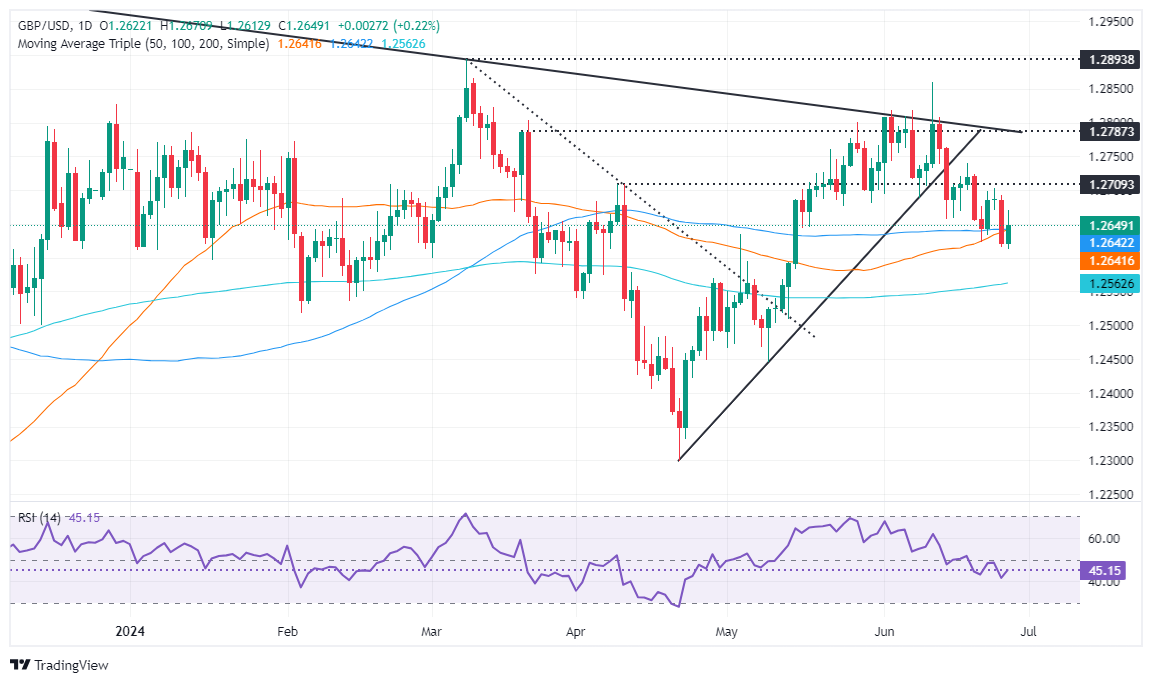- GBP/USD rises to 1.2652, up 0.25%, remaining below the weekly high of 1.2703.
- Neutral technical position; The daily MAs range between 1.2641 and 1.2557.
- The ‘evening star’ pattern and bearish RSI suggest a possible decline; support at 1.2641/39 (50 and 100 DMAs), 1.2600, 1.2555 (200 DMAs).
- For a bullish move, GBP/USD must surpass 1.2700 and face resistance at 1.2730/40.
The British Pound gains some momentum against the Dollar but continues to trade below weekly highs of 1.2703 as investors await the release of the US Personal Consumption Expenditure (PCE) Price Index, along with fears of the upcoming general elections in the United Kingdom. GBP/USD is trading at 1.2652, up 0.25%.
GBP/USD Price Analysis: Technical Perspective
GBP/USD has a neutral bias, further confirmed by the daily moving averages (DMAs) stuck in the 1.2641-1.2557 range. The formation of an ‘evening star’ prevented traders from recovering 1.2700, exacerbating the Cable’s decline to a six-week low of 1.2612.
Momentum favors sellers, as shown by the RSI in bearish territory; Therefore, the path of least resistance for GBP/USD leans downward.
The first support would be the confluence of the 50 and 100 DMAs around 1.2641/39, followed by the psychological figure of 1.2600. Once broken, the next demand zone to challenge would be the 200-DMA at 1.2555.
For a bullish continuation, traders must reclaim 1.2700 and break above a previous support-turned-resistance trend line around 1.2730/40.
GBP/USD Price Action – Daily Chart
The British Pound FAQs
The British Pound (GBP) is the oldest currency in the world (886 AD) and the official currency of the United Kingdom. It is the fourth most traded currency unit in the world, with 12% of all transactions and an average of $630 billion per day, according to 2022 data.
Its key currency pairs are GBP/USD, also known as “Cable”, which represents 11% of the forex market, GBP/JPY, or the “Dragon” as it is known to traders (3%), and EUR/GBP (2%). The pound sterling is issued by the Bank of England (BoE).
The most important factor influencing the value of the Pound Sterling is the monetary policy decided by the Bank of England. The Bank of England bases its decisions on achieving its main objective of “price stability”, that is, a stable inflation rate of around 2%. Its main tool to achieve this is the adjustment of interest rates.
When inflation is too high, the Bank of England tries to contain it by raising interest rates, which makes access to credit more expensive for individuals and companies. This tends to be positive for the GBP, as higher interest rates make the UK a more attractive place for global investors to park their money.
When inflation is too low, it is a sign that economic growth is slowing. In this scenario, the BoE will consider lowering interest rates to make credit cheaper, so that companies borrow more to invest in growth-generating projects.
The published data gauges the health of the economy and may influence the value of the Pound sterling. Indicators such as GDP, manufacturing and services PMIs, and employment can influence the direction of the Pound.
A strong economy is good for the British pound. Not only does it attract more foreign investment, but it may encourage the Bank of England to raise interest rates, which will directly strengthen the Pound. Otherwise, if economic data is weak, the pound is likely to fall.
Another significant data for the pound sterling is the trade balance. This indicator measures the difference between what a country earns from its exports and what it spends on imports during a given period.
If a country produces highly sought-after exports, its currency will benefit exclusively from the additional demand created by foreign buyers wishing to purchase these goods. Therefore, a positive net trade balance strengthens a currency and vice versa for a negative balance.
Source: Fx Street
I am Joshua Winder, a senior-level journalist and editor at World Stock Market. I specialize in covering news related to the stock market and economic trends. With more than 8 years of experience in this field, I have become an expert in financial reporting.








